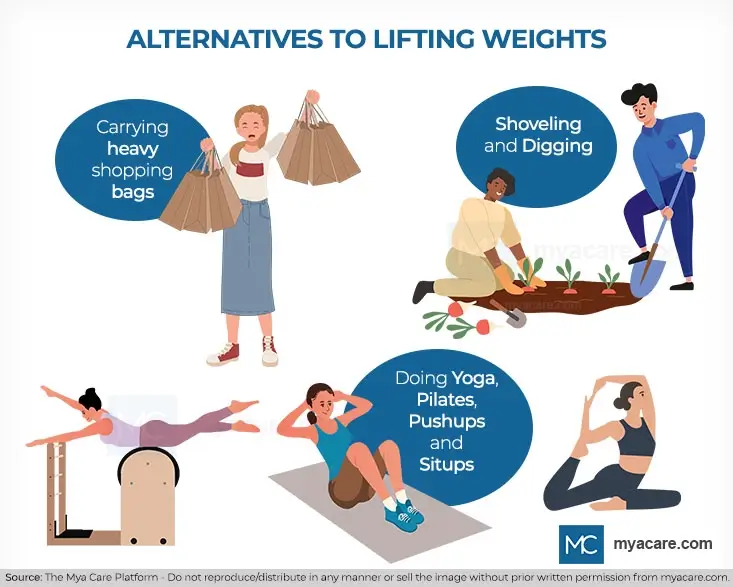Lifting Weights Could Help You Live Longer

Medically Reviewed by Dr. Sony Sherpa (MBBS) - October 4, 2022
According to new research, a combination of lifting weights and aerobics in your fitness regimen may be optimal if you want to live a long, healthy life.
Introduction
Exercises that improve or maintain muscular strength and endurance, balance, or body composition are muscle-strengthening exercises (MSE).
One of the most prevalent forms of MSE is weightlifting, whether done with free weights or machines, and it is one of the most effective forms of strength training.
2018's Physical Activity guidelines stated that all adults should engage in at least 150–300 minutes per week of moderate-intensity aerobic physical activity (also known as MVPA), 75–150 minutes per week of vigorous-intensity aerobic physical exercise, or an equal combination of the two [1]. Notably, MSE for all main muscle groups should be performed by adults at least twice weekly.
A study published in the British Journal of Sports Medicine found that vigorous physical activity and muscle strengthening exercises such as lifting weights lower the chance of dying young but combining the two appears to have extra advantages [2].
In this research, the National Cancer Institute conducted the relationship between exercise habits and the risk of dying due to chronic illnesses were studied. The research took data over a ten-year follow-up period from almost 100,000 adults across the United States and studied their exercise habits and illnesses.
They found that participants who did 150-300 minutes a week of aerobic exercise were, on average, 32% less likely to die from any chronic diseases.
According to the research, those who engaged in the suggested 150 minutes of moderate exercise each week lived longer than those who did not; however, those who mixed regular aerobic exercise with muscle-strengthening activities once or twice per week fared even better.
Lifting weights and other forms of resistance training have been related to 9% decreased mortality rates.
However, aerobics and resistance training take this a step further because people who engaged in both aerobic and resistance training once or twice per week had mortality rates that were 41% lower.
Additionally, the mortality rates of those who lifted weights and did 300 minutes of cardio per week were up to 47% lower than those of their inactive counterparts.
So as per this research, it is better to start lifting weights to live a long and healthy life. And even if you already have an exercise regimen with some cardio, it is better to add some weight lifting as well.
This study also showed that weightlifting was more beneficial to women than men.
Are there Alternatives to lifting Weights?
Yes. You don't have to hit the gym to start lifting weights. There are other ways you can start building up your muscles. These can be seemingly simple things like
- Carrying heavy shopping bags
- Doing yoga and pilates,
- Pushups and situps,
- Shoveling and digging in the garden

Similarly, aerobic exercises, such as the ones that get the heart and the lungs lifting, will also help maintain a healthy body. This includes

Are there Other Advantages to lifting Weights?
Lifting weights has other advantages as well, such as:
Developing a Better Posture
Lifting weights can help build up the bones, muscles, and other body-supporting tissues, including the lower back. This helps you maintain better alignment throughout the day and enhance your posture and alleviate back pain and improve your ability to perform everyday activities.
Improving Sleep
Exercise increases sleep length or quality, that is, how well and how long you sleep. Research has shown that people who frequently engaged in weight training slept longer and better than people who regularly engaged in cardio activity [3].
Boosting Confidence
Weight training helps to increase the levels of endorphins in your brain, which will help improve your mood and even build up your confidence.
Making the Bones Stronger
Strength exercise can promote bone density and lower the risk of osteoporosis by placing stress on your bones. It can aid in gaining and maintaining strength and muscle mass.
Maintaining Weight Loss
By keeping muscle mass to prevent your metabolism from slowing down and by burning calories before, during, and after exercises, weight training can promote weight loss and help maintain weight.
Enhancing Metabolism
Strength exercise and lifting weights can increase the lean muscle in your body, which helps to raise your resting metabolic rate (RMR) [4]. The number of calories your body needs to execute essential processes like breathing, circulation, and digesting is your RMR. Thus, a heavy-resistance strength-training program raises RMR, possibly via elevating fat-free mass and sympathetic nervous system activity.
Reducing Inflammation
In older women with cognitive impairment, resistance training can simultaneously improve anti-inflammatory balance, physical performance, and cognitive profile [5]. Lifting weights has been shown to reduce aging-related immune senescence and cognitive decline while improving physical fitness.
Conclusion
So with all this information, it is safe to say that hitting the gym, working out a sweat carrying shopping bags, or just digging into the garden with the shovel could help you live a longer and healthier life.
To search for the best doctors and healthcare providers worldwide, please use the Mya Care search engine.
The Mya Care Editorial Team comprises medical doctors and qualified professionals with a background in healthcare, dedicated to delivering trustworthy, evidence-based health content.
Our team draws on authoritative sources, including systematic reviews published in top-tier medical journals, the latest academic and professional books by renowned experts, and official guidelines from authoritative global health organizations. This rigorous process ensures every article reflects current medical standards and is regularly updated to include the latest healthcare insights.

Dr. Sony Sherpa completed her MBBS at Guangzhou Medical University, China. She is a resident doctor, researcher, and medical writer who believes in the importance of accessible, quality healthcare for everyone. Her work in the healthcare field is focused on improving the well-being of individuals and communities, ensuring they receive the necessary care and support for a healthy and fulfilling life.
Featured Blogs



